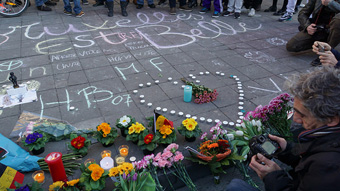CURRENT AFFAIRS
Brussels, Terrorists, and Fear
By KJM

ISIS and various other terrorist organizations throughout the world indubitably hold great hatred for Christianity, and Western society in general. Having resorted to repeated violence, they have required the world to respond, not only by grieving with families and communities torn apart, but with political and ideological stances. Especially because the US is in the midst of a polarized election year, the rhetoric has come fast and strong from politicians and voters alike.
Of course we must respond. But as Christians, especially, we need to be vigilant about how we go about those responses. Jesus commanded that we mourn with those who mourn (Romans 12:15) while being peacemakers (Matthew 5:9) and lovers of our neighbors (Mark 12:31), even the neighbors who hate us and object to our way of life (Luke 10:33, John 4:4-26). Yet, as I encounter Christians discussing these topics through social media, news sites, comments sections, church-goers, and politicians, I hear fear and fear-based hate drowning out grief, love, and peacemaking.
Consider one of Donald Trump's tweets on the matter:
Also consider Ted Cruz's statement that, "We need to empower law enforcement to patrol and secure Muslim neighborhoods before they become radicalized."Do you all remember how beautiful and safe a place Brussels was. Not anymore, it is from a different world! U.S. must be vigilant and smart!
— Donald J. Trump (@realDonaldTrump) March 22, 2016
These sorts of declarations, which are merely prime examples of wide-spread rhetoric, inherently increase the fear response we all experience when hearing of wanton violence. Of course, we want to be safe, but when fear is deepened by insinuation, like Trump's tweet, to the point of calling for unconstitutional and arguably unethical police action, like Cruz's statement, we risk growing a new monster: hatred.
And hatred is what we see spreading. On Facebook posts intended to grieve the dead in Brussels, there are many comments calling for the death of Muslims, or for America to summarily deport Muslims and/or Middle Easterners. On Twitter, some American users are calling for the detonation of a Nuclear Weapon in the Middle East. These are all "solutions" that would affect hundreds of thousands of families with economic ruin and/or death.
Yet: Jesus called us to be peacemaking, loving people. Perhaps even more pertinent? He did it. When faced with Pharisees', crowds', and his own friend's desire to see him dead, Jesus, an all-powerful being, responded with strength, yes, but a strength built on love that never displayed fear or hatred in return. To Judas he merely asked why, to the Pharisees he alternately explained how they were misinterpreting his actions and the scriptures or returned his focus to the disciples or crowds. Even the cleansing of the temple was a display of righteous anger, not violent hatred or fearful retaliation.
Our own consciences are not the only victims of our retaliation to fear, nor arguably the most important. According to the UN's High Commission on Refugees, there are about 4.8 million Syrian refugees, and an additional 6.6 million displaced but still within Syria – and half of these people are children. Syrians have seen loved ones killed and their country ripped apart by ISIS, while Americans largely watch from afar, so if anyone has the greater reason to hate ISIS, it is the Syrian refugees. That is to say: we have a common enemy. But our fear is blinding us, making refugees two-dimensional and merely people who share a religious title with ISIS. So we are responding with hatred, born out of fear, toward mothers and fathers and millions of children who are immediate victims of terrorism.
The world contains much violence and uncertainty. We are not called to plug our ears and ignore it, but we are called to respond, to those merely different as much as the truly evil, with love. John, "the disciple Jesus loved," was the one who declared that "perfect love casts out fear," (1 John 4:18). It is time for American Christians to heed Jesus' commands, example, and the words of his own disciples: let us avoid fear and hate, and be willing to love.
Image Credit: Miguel Discart; ("Gathering of people after the attacks of Brussels"); Creative Commons
Tags: Biblical-Truth | Controversial-Issues | Current-Issues | Political-Issues
comments powered by Disqus
Published 3-28-16

